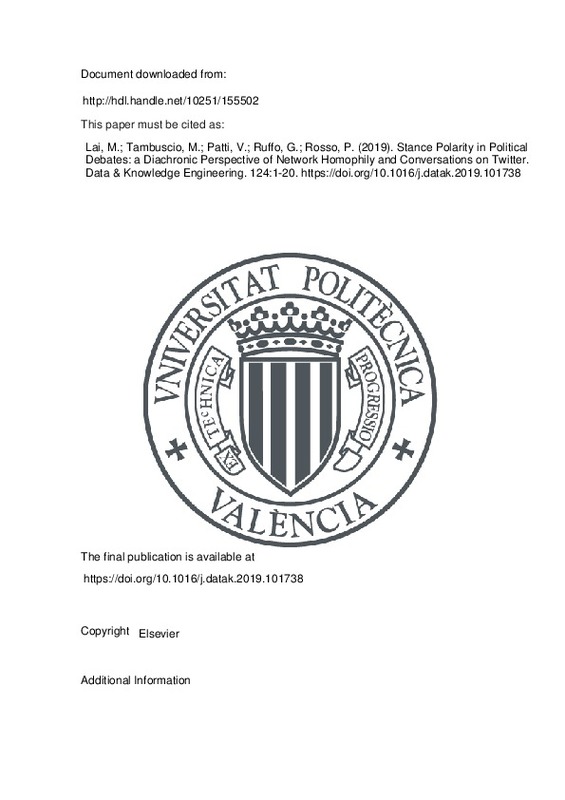JavaScript is disabled for your browser. Some features of this site may not work without it.
Buscar en RiuNet
Listar
Mi cuenta
Estadísticas
Ayuda RiuNet
Admin. UPV
Stance Polarity in Political Debates: a Diachronic Perspective of Network Homophily and Conversations on Twitter
Mostrar el registro sencillo del ítem
Ficheros en el ítem
| dc.contributor.author | Lai, Mirko
|
es_ES |
| dc.contributor.author | Tambuscio, Marcella
|
es_ES |
| dc.contributor.author | Patti, Viviana
|
es_ES |
| dc.contributor.author | Ruffo, Giancarlo
|
es_ES |
| dc.contributor.author | Rosso, Paolo
|
es_ES |
| dc.date.accessioned | 2020-11-24T04:31:53Z | |
| dc.date.available | 2020-11-24T04:31:53Z | |
| dc.date.issued | 2019-11 | es_ES |
| dc.identifier.issn | 0169-023X | es_ES |
| dc.identifier.uri | http://hdl.handle.net/10251/155502 | |
| dc.description.abstract | [EN] In the last decade, social media gained a very significant role in public debates, and despite the many intrinsic difficulties of analyzing data streaming from on-line platforms that are poisoned by bots, trolls, and low-quality information, it is undeniable that such data can still be used to test the public opinion and overall mood and to investigate how individuals communicate with each other. With the aim of analyzing the debate in Twitter on the 2016 referendum on the reform of the Italian Constitution, we created an Italian annotated corpus for stance detection for automatically estimating the stance of a relevant number of users. We take into account a diachronic perspective to shed lights on users' opinion dynamics. Furthermore, different types of social network communities, based on friendships, retweets, quotes, and replies were investigated, in order to analyze the communication among users with similar and divergent viewpoints. We observe particular aspects of users' behavior. First, our analysis suggests that users tend to be less explicit in expressing their stances after the outcome of the vote; simultaneously, users who exhibit a high number of cross-stance relations tend to become less polarized or to adopt a more neutral style in the following phase of the debate. Second, despite social media networks are generally aggregated in homogeneous communities, we highlight that the structure of the network can strongly change when different types of social relations are considered. In particular, networks defined by means of reply-to messages exhibit inverse homophily by stance, and users use more often replies for expressing diverging opinions, instead of other forms of communication. Interestingly, we also observe that the political polarization increases forthcoming the election and decreases after the election day. | es_ES |
| dc.description.sponsorship | The work of Viviana Patti and Giancarlo Ruffo was partially funded by the Fondazione CRT under research project the Hate Speech and Social Media (2016.0688), and the "Progetto di Ateneo/CSP 2016" under research project "Immigrants, Hate and Prejudice in Social Media" (S1618_L2_BOSC_01). The work of Paolo Rosso was partially funded by the Spanish MICINN under the research project "MISMIS-FAKEnHATE on Misinformation and Miscommunication in social media: FAKE news and HATE speech" (PGC2018-096212-B-C31). | es_ES |
| dc.language | Inglés | es_ES |
| dc.publisher | Elsevier | es_ES |
| dc.relation.ispartof | Data & Knowledge Engineering | es_ES |
| dc.rights | Reconocimiento - No comercial - Sin obra derivada (by-nc-nd) | es_ES |
| dc.subject | Stance | es_ES |
| dc.subject | Political debates | es_ES |
| dc.subject | Homophily | es_ES |
| dc.subject | es_ES | |
| dc.subject.classification | LENGUAJES Y SISTEMAS INFORMATICOS | es_ES |
| dc.title | Stance Polarity in Political Debates: a Diachronic Perspective of Network Homophily and Conversations on Twitter | es_ES |
| dc.type | Artículo | es_ES |
| dc.identifier.doi | 10.1016/j.datak.2019.101738 | es_ES |
| dc.relation.projectID | info:eu-repo/grantAgreement/UNITO//S1618_L2_BOSC_01/ | es_ES |
| dc.relation.projectID | info:eu-repo/grantAgreement/Fondazione CRT//2016.0688/ | es_ES |
| dc.relation.projectID | info:eu-repo/grantAgreement/AEI/Plan Estatal de Investigación Científica y Técnica y de Innovación 2017-2020/PGC2018-096212-B-C31/ES/DESINFORMACION Y AGRESIVIDAD EN SOCIAL MEDIA: AGREGANDO INFORMACION Y ANALIZANDO EL LENGUAJE/ | es_ES |
| dc.rights.accessRights | Abierto | es_ES |
| dc.contributor.affiliation | Universitat Politècnica de València. Departamento de Sistemas Informáticos y Computación - Departament de Sistemes Informàtics i Computació | es_ES |
| dc.description.bibliographicCitation | Lai, M.; Tambuscio, M.; Patti, V.; Ruffo, G.; Rosso, P. (2019). Stance Polarity in Political Debates: a Diachronic Perspective of Network Homophily and Conversations on Twitter. Data & Knowledge Engineering. 124:1-20. https://doi.org/10.1016/j.datak.2019.101738 | es_ES |
| dc.description.accrualMethod | S | es_ES |
| dc.relation.publisherversion | https://doi.org/10.1016/j.datak.2019.101738 | es_ES |
| dc.description.upvformatpinicio | 1 | es_ES |
| dc.description.upvformatpfin | 20 | es_ES |
| dc.type.version | info:eu-repo/semantics/publishedVersion | es_ES |
| dc.description.volume | 124 | es_ES |
| dc.relation.pasarela | S\409393 | es_ES |
| dc.contributor.funder | Fondazione CRT | es_ES |
| dc.contributor.funder | Agencia Estatal de Investigación | es_ES |
| dc.contributor.funder | Università degli Studi di Torino | es_ES |







![[Cerrado]](/themes/UPV/images/candado.png)

